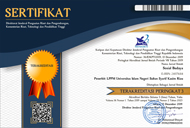STAFFING DALAM ALQURAN DAN HADIS DITINJAU DARI MANAJEMEN PENDIDIKAN
Abstract
Staffing in an organization can be defined as a series of processes and efforts to acquire, develop, motivate, and evaluate the overall human resources. It is required within the organization in achieving its goals. In staffing, putting a person in a work should be in accordance with his capabilities and expertise so that all are expected to be achieved. Job placement principle is the principle of humanity, democracy, the right man on the right place, equal pay for equal work, unity of direction, the principle of unity of purpose, unity of command, Efficiency and Productivity Work. The concept is the placement, promotion, transfer and demotion. Staffing in the Qur'an and Hadith seen from education management is an employee must complete properly, responsibility, trust, has the capability and expertise, serve, work ethic, strong and trustworthy, honest, sincere, true and trustful, physical and mental strength, and high manners. Professionalism in view of sharia is characterized by three things, namely ahliyah (expertise), himmatul 'charity (high work ethic), trustworthy (reliable).
Full Text:
PDFReferences
Abdul Hamid Mursi, SDM yang Produktif: Pendekatan Alquran dan Sains, (Jakarta: Gema Insani, 1997) .
Bernandin, H. John and Joyce E. A. Russel, Human Resources Management, (MacGraw-Hill, Inc, Singapore, 1993).
Bambang Wahyudi, Manajemen Sumber Daya Manusia, (Bandung: BPFE, 1991).
Hadiyah Salim, Tarjamah Mukhtarul Ahadits, (Bandung: PT. Alma’arif, Cet IV, 1985)
Harold Koontz.,Cyril O’Donnel, Principles of Management, (Tokyo: Kogakusha Co. Ltd).
http://kamusbahasainggris.com/info/translate-kalimat-bahasa-inggris.html
http://fastkaya.blogspot.co.id/2010/12/pengertian-staffing-dalam-manajemen.html.
http://www.hukumtenagakerja.com/asas-asas-dan-fungsi-penempatan-kerja/
http://forum.kompas.com/threads/288674-Pengertian-Planning-Organizing-Staffing-dan-Fungsinya, diakses tanggal 22 oktober 2015,
http://repository.usu.ac.id/bitstream/123456789/17983/4/Chapter%20II.pdf.
http://sasmitadp31.blogspot.com/2012/04/penempatan-pegawai.html
http://sasmitadp31.blogspot.com/2012/04/penempatan-pegawai.html.
John M. Echols, Hasan Shadily, Kamus Inggris Indonesia, (Jakarta: Gramedia).
Mathis & Jackson, Manajemen SDM, (Jakarta: Salemba Empat, 2001)
M. Quraish Shihab, Tafsir Al-Misbah Pe-san, Kesan dan Keserasian Alquran, (Jakarta: Lentera Hati, 2002)
Muhammad Ismail Yusanto dan Muham-mad KarebetWidjajakusuma, Meng-gagas Bisnis Islam, (Jakarta: Gema Insani Press, 2002)
Sastrohadiwiryo, Bedjo Siswanto, Mana-jemen tenaga Kerja Indonesia: Pen-dekatan Admnistratif dan Opera-sional, (Jakarta : Bumi Aksara, 2002),
Sondang. P. Siagian, Manajemen Sumber Daya Manusia, (Penerbit: Bumi Aksara, 1999)
T. Hani Handoko, Manajemen Personalia dan SDM, (Penerbit ANDI, Yokya-karta, 2003) .
Undang-Undang Nomor 13 Tahun 2003 tentang Ketenagakerjaan (“UU Kete-nagakerjaan”) dalam Bab VI meng-atur mengenai Penempatan Tenaga Kerja. Dalam Pasal 32 ayat (1) UU Ketenagakerjaan.
Veithzal Rivai, Manajemen Sumber Daya Manusia untuk Perusahaan dari Te-ori ke Praktek, (Jakarta: Raja Grafin-do persada, 2006),
DOI: http://dx.doi.org/10.24014/sb.v12i2.1936
Refbacks
- There are currently no refbacks.
Published by:
Center for Research and Community Development
Universitas Islam Negeri Sultan Syarif Kasim Riau
Jl. H. R. Soebrantas KM 15,5 ,Tuah Madani, Tampan,
Pekanbaru, Riau 28293
Indexed By:


.jpg)



